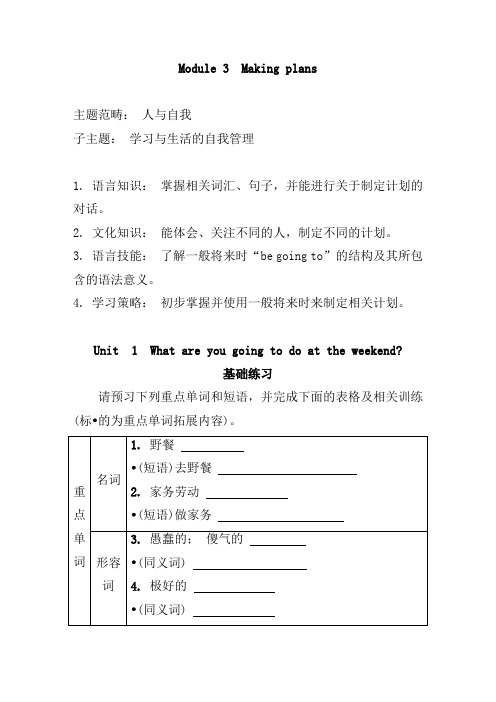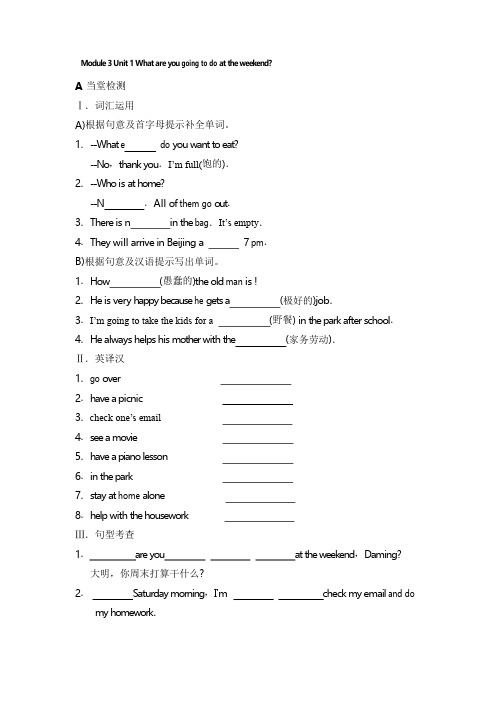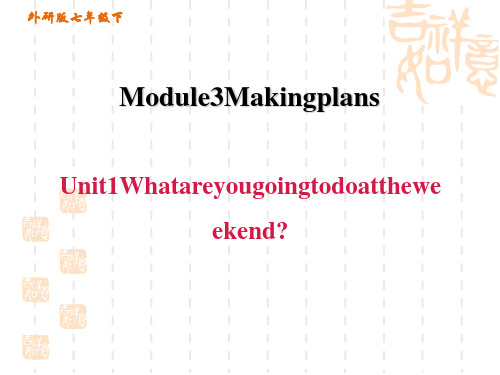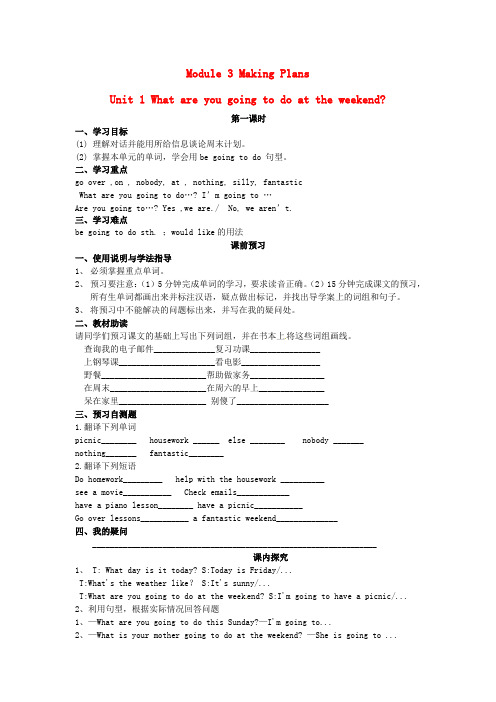外研版七下module3 unit1 导学案
新外研版七年级英语下册导学案(M3-Unit 1讲义)

Module 3 Making PlansUnit 1 What are you going to do at the weekend?第一课时一、学习目标(1) 理解对话并能用所给信息谈论周末计划。
(2) 掌握本单元的单词,学会用be going to do 句型。
二、学习重点go over ,on , nobody, at , nothing, silly, fantasticWhat are you going to do…? I’m going to …Are you going to…? Yes ,we are./ No, we aren’t.三、学习难点be going to do sth. ;would like的用法课前预习一、使用说明与学法指导1、必须掌握重点单词。
2、预习要注意:(1)5分钟完成单词的学习,要求读音正确。
(2)15分钟完成课文的预习,所有生单词都画出来并标注汉语,疑点做出标记,并找出导学案上的词组和句子。
3、将预习中不能解决的问题标出来,并写在我的疑问处。
二、教材助读请同学们预习课文的基础上写出下列词组,并在书本上将这些词组画线。
查询我的电子邮件______________复习功课________________上钢琴课______________________看电影__________________野餐________________________帮助做家务_________________在周末______________________在周六的早上_______________呆在家里____________________ 别傻了_____________________三、预习自测题1.翻译下列单词picnic________ housework ______ else ________ nobody _______nothing_______ fantastic________2.翻译下列短语Do homework_________ help with the housework __________see a movie___________ Check emails____________have a piano lesson________ have a picnic___________Go over lessons___________ a fantastic weekend______________四、我的疑问_________________________________________________________________课内探究1、T: What day is it today? S:Today is Friday/...T:What's the weather like?S:It's sunny/...T:What are you going to do at the week end? S:I'm going to have a picnic/...2、利用句型,根据实际情况回答问题1、—What are you going to do this Sunday?—I'm going to...2、—What is your mother going to do at the weekend? —She is going to ...3、—what are your friends going to do at the weekend?—They are going to...3、听录音掌握大意并完成Activity4.(一)1、听力练耳Listen and match (听录音,连线组成短语,然后朗读这些短语,背诵)2、Write the phrases in Activity1 and the picture.(Activity2)(二)对话处理读前听Listen to the dialogue, and answer the questions.1、Is Daming going to check his email?2、Is Betty going to a party at a friend’s home on Saturday evening?3、What is Daming going to do on Saturday afternoon?听后读:最大声、最准确的朗读对话一遍,说一说Betty和Daming的计划。
Module3Unit1导学案英语七年级下册

Module 3Making plans主题范畴:人与自我子主题:学习与生活的自我管理1. 语言知识:掌握相关词汇、句子,并能进行关于制定计划的对话。
2. 文化知识:能体会、关注不同的人,制定不同的计划。
3. 语言技能:了解一般将来时“be going to”的结构及其所包含的语法意义。
4. 学习策略:初步掌握并使用一般将来时来制定相关计划。
Unit 1What are you going to do at the weekend?基础练习请预习下列重点单词和短语,并完成下面的表格及相关训练(标•的为重点单词拓展内容)。
学以致用根据语境或提示,完成填空。
1. What else (其他) are you going to say?2. On Sunday morning, Sam usually gets up very late.3. Let's go out and have a picnic (野餐) tomorrow.4. Don't be silly (傻气的), Mike.5. Lily often helps her mother do the h ousework at the weekend.6. Tony is going o ver his lessons at home because there will be an exam tomorrow.7. They are going to see a fantastic (极好的) film this weekend.8. He often makes fun of(取笑) others, so likes him.9. His father usually gets up at six o'clock and (check) his email.10. She is going to buy some food because there is nin the fridge(冰箱).佳句仿写用句中黑体词或短语仿写句子。
外研版英语七年级下册Module3 Unit1 教材知识详解

Module3 Unit1 教材知识详解1. What are you going to do at the weekend?你们周末打算做什么?be going to(有方案、有目的〕打算做某事,be going to后跟动词原形,表示“〔有方案、有目的〕打算做某事〞。
be要根据句子主语来确定。
be going to 构造可以和表示将来的时间状语,如tomorrow, next week, next year等连用。
如:She is going to study in Canada next year.她明年要去加拿大学习。
2. check检查;查看,账单check作动词,意为“检查;查看〞。
如:Check your homework before you hand it in.你在交作业之前检查一下。
check还可以做名词,意为“账单〞。
如:May I have the check, please?请把账单给我好吗?3.go over 复习;练习go over为固定短语,意为“复习;练习〞。
如:Go over what we learn today.复习一下我们今天所学的内容。
4. with the housework在家务劳动方面housework作不可数名词,意为“家务劳动〞。
常用短语do housework意为“做家务〞。
如:She does not like to do housework.她不愿意做家务。
5.On Saturday morning, I’m going to check m y email and do my homework.星期六上午我打算查看电子邮件,然后做作业。
on作时间介词时,后接具体的某一天,或者某一天的上午、下午或晚上。
如:On September 9, we have a class party.在九月九日,我们有一个班级聚会。
6. Then I’m going to help with the housework.之后我要帮助做家务。
七年级英语下册module-3-Unit1课件1外研社

01
Teaching objectives
Knowledge objectives
掌握本单元的核心词汇和短语, 理解课文中的语法结构和表达方
式。
了解课文所涉及的文化背景和主 题内容,理解英语语言在现实生
活中的运用。
熟悉英语阅读和写作的基本技巧 和方法,提高英语语言水平。
Ability goals
培养学生的团队合作 精神和集体荣誉感, 增强班级凝聚力和向 心力。
培养学生的跨文化意 识和国际视野,尊重 不同文化背景和价值 观。
02
Teaching content
Analysis of Text Content
文本主题
本单元的文本主题是关于家庭和家庭成员的介绍,通过阅 读和分析文本,学生可以了解不同家庭的文化背景和生活 方式。
知识呈现
使用PPT、板书等形式,系统地介绍 本节课的重点和难点,确保学生理解 。
互动讲解
鼓励学生提问,及时解答学生的疑惑 ,促进师生互动。
Practice and consolidation
课堂练习
设计有针对性的练习题,让学生在课堂上进行实践,加深理 解。
小组合作
组织学生进行小组讨论或合作完成任务,提高团队协作能力 。
7th grade English textbook module3-unit1 coursewa
目录
• Teaching objectives • Teaching content • teaching method • teaching process • Teaching Reflection
01
While participation was high, more variety in activities
外研版英语七年级下册:Module 3 Unit 1 What are you going to d

教学设计外研版七年级下册课题:Module 3 Making plans Unit 1:What are you going to do at the weekend?一.课型; Listening and speaking二.教材分析本单元是第三模块的核心组成部分,以讨论周末计划为主要话题。
该话题比较贴近学生生活,因此学生对介绍自己的周末计划很感兴趣,很容易展开教学活动,便于学生理解运用。
本节课在学生掌握有关周末活动的动词短语的基础上,在大量听说训练的基础上,通过讨论周末计划,学习用be going to 表达自己打算或计划做的事。
三.学生分析本节课的授课对象是七年级学生,他们活泼好动,善于表现自己,大多数学生对英语学习很感兴趣,尤其是在进行口语练习的环节时,都很积极。
本节课在设计用be going to 谈论周末计划这一话题时,设计了大量的pairwork 练习,便于学生根据自己的实际情况展开活动。
这节课的设计以学生感兴趣内容为出发点,以培养学生的听说能力为目的,使学生积极参与到课堂中来。
并充分利用多媒体等教学辅助设备,加强直观印象,增加课堂教学的趣味性。
四.教学目标根据《中学英语课程标准》制定如下目标:语言知识目标1. 学习掌握本课生词与短语:plan, go over, picnic, have a picnic, nothing,silly, fantastic, nobody, housework, else2. 观察并了解be going to 形式的构成, 能简单使用一般将来时(am/is/are going to do sth)3. 通过用英语与同伴谈论自己和周围人们打算做的事, 进一步熟悉be going to的用法。
语言技能目标1.听:能听懂含有be going to 加动词原形所表达的意思,并能听懂他人谈论周末计划的内容。
2.说:能借助所给词组进行pairwork 练习,能用be going to 谈论周末计划。
七年级英语下册module-3-Unit1plan课件2外研社

教师讲解、示范,学生小组讨论、练习,教师点评指导。
时间安排
30-40分钟。
Consolidating exercises
目的
01
通过练习巩固所学知识,帮助学生加深理解和记忆。
方法
02
教师布置练习题,学生独立完成或小组讨论,教师点评和纠正。
时间安排
03
10-15分钟。
05
Teaching Reflection
Task driven
பைடு நூலகம்目的
通过完成实际任务,培养学生 的语言运用能力和自主学习能 力。
方法
设计一系列与学习主题相关的 任务,让学生以个人或小组的 形式完成,任务形式可以包括 写作、口语表达、角色扮演等 。
示例
在学习“环保”主题时,教师 可以布置一个小组任务,要求 学生调查家乡的环保问题并提 出解决方案,最后在课堂上展 示。
The integration of digital tools and resources enhanced the learning experience and made it more engaging for students.
Shortcomings and Improvements
Limited time for student feedback
01
Teaching objectives
Knowledge objectives
掌握本单元的核心词汇和短语,如“predict”、 “conclusion”、“supporting evidence”等。
理解并运用本单元的语法点,如现在完成时和过去 完成时的用法。
熟悉不同类型的文本,如说明文、议论文和记叙文 ,并了解其特点。
外研版英语7年级下册:Module 3 Unit 1 What are you going to d

Module 3 Making Plans— Unit 1 What are you going to do at the weekend?班级 姓名 _ _ __ 第 _ 组 组长签名 ____________ 家长签名 ________ 【学习目标】1、会使用本课所需掌握的四会单词;2、能理解和运用课文中的典型词组及句型;3、能用be going to 表达自己的计划、安排,并能询问对方的计划、安排。
【学习过程】一、课前预习:1、单词拼写1) What are you going to do at the w . 2) The programme is quite __________(极好的).3) What are your p for holiday? 4) What about having a p _______ in the park.5) There ’s n_______________ but a pen in the pencil box. 6) Don ’t be s__________, Lucy.7) On Sunday, I often help my mother with the h____________.2、在课本P14 (3)中划出下列词组,把中文意思写在课文中,在填在下面横线上。
1) at the weekend________________________ 2) on Saturday morning_____________________ 3) check my email________________________ 4) help with the housework__________________5) see a movie___________________________ 6) have a piano lesson______________________ 7) on Sunday afternoon____________________ 8) have a picnic___________________________9) go over lessons_________________________ 10) do my homework_______________________ 二、课堂活动:1、根据课文内容做练习A .读P14(3)课文,将他们打算去做的事情填在相应的横线上。
Module3Unit1HaveyougottheHarryPotterDVDs(教学设计)外研版(

小学英语课时备课设计学习重难点重点:1.会正确认读单词library, show,并理解意思。
2.正确使用句型Have you got ...? Sorry, we haven’t got... But we have got...进行问答。
难点:能运用句子句型Have you got...? 及Sorry, we haven’t got... But we have got...询问及回答是否有某物。
课前准备导学案、课本、课文视频、PPT学习过程环节与目标学习内容及学生活动评价活动指导与补救热身1.Guessing Game教师活动:播放PPT,What’s it?学生活动:观看图片,迅速说出案:DVD,book,ruler,pen,eraser, Schoolbag 能正确说出已学的文具类词汇,为下一步学习做好铺垫这个环节的词汇比较简单,需注意的是eraser前加an导入游戏导入,学习句型通过chant 情境导入,引出课文情境1.游戏热身教师出示PPt,只展示这些学习用具的一部分,教师引导学生猜测并用英语询问:Have you got...?老师回答Sorry, I haven’t got...,或Yes, I’ve got...(猜对的话将该学习用具展示一下),示范后可以让掌握较好的学生做小老师进行此活动2.学习课文1 chant:听chant,回答问题:Who is he?What’s the present?Can you guess the name of the book?模仿跟读chant一遍齐说、两个小组、中弱两个学生示范齐读、两个小组、抽读中弱两层次学生展示chant;两两同桌检查chant指导library的拼读chant两两检查chant课文讲解目标1、2:能够正确理解课文大意、正确朗读课文1.展示课文Part2图片Where are Amy and Lingling ?Have they got the Harry Potter DVDs?2.听课文回答问题:(1)Has the library got the HarryPotter DVDs?(2)Has the library got the HarryPotter books?(3)Do children like Harry Potter inChina?(4)Should they give the books backin two weeks?3.讲解重点词汇:1.课文相关问题回答是否正确。
外研版英语7年级下册:Module 3 Unit 1 What are you going to d

《Module 3 Making plans Unit 1 What are you going to do at theweekend ?》教学设计一、课题:《Module 3 Making plans Unit 1 What are you going to do at the weekend ?》是外研版《新标准》七年级英语下册第三模块第一单元的内容。
二、教材分析:本模块以“制定计划”为中心话题,此话题的选择十分符合教学和学习的实际。
通过一个学期的初中学习,本模块的学习能帮助学生逐步养成良好的有计划的学习和生活习惯。
对于那些已经有了良好的计划意识的学生来说,通过本模块的学习能够更加坚定他们的信心,在总结分享自己的经验过程中能更好的计划自己的学习、生活乃至人生。
第一单元是一节听说课型的新授课,主要以对话的形式呈现,学生在掌握一些关于周末活动的动词词组的前提下,与同学们谈论周末的计划、安排,学习用“be going to”句型表达自己打算或计划要做的事情,表达对周末生活的期待。
本单元因为是本模块的第一单元,学生在学习过程中进行充足的输入准备,不必对“be going to”句型所有人称的使用都能熟练掌握。
三、学情分析:七年级的学生经过小学和上一学期的英语学习,已经具备了英语的基本语言能力,能够说出一些有关于周末计划的动词短语,但是学生的周末生活并不是那么丰富,教师为学生提供了一些相关课外活动的图片来扩充一些相关词汇,教师也可以引导学生谈论一个“有趣”或“有意义”的周末计划,避免学生一张口只会说一些“doing homework”或“watching TV”的现象,同时可以对学生进行做有意义的事的德育渗透,并且对于那些学习和生活中缺乏计划的学生来说,这个话题可以帮助他们逐步建立起良好的、有计划的生活和学习习惯。
四、教学目标:1. 语言知识目标(1)话题:计划与安排(2)功能:能谈论和制订周末的计划、安排(3)语法:能理解“be going to”的意义并尝试使用(4)词汇:能理解并掌握下列词汇、短语、句型名词:plan, picnic, housework ;形容词:silly, fantastic;代词:nothing, nobody;副词:else, forward;介词:on, at;短语:go over, have a picnic, at the weekend句型:What are you going to do? I’m going to …. Are you going to …? Yes, we are.No, we aren’t.(5)语音:掌握元音字母“i”在重读开音节中读[ai]、在重读闭音节中读[I]以及读[i:]与半元音字母“y”在在重读音节中读[ai]、在非重读音节中读[I]2. 语言技能目标(1)听:能听懂本课有关周末的计划、安排的对话,并能判断出对话中人物的计划(2)说:能用“be going to”谈论自己的周末计划,并询问他人的计划(3)读:能模仿点读笔声音洪亮、语音语调准确、流畅地朗读本课对话3. 学习策略目标能根据自己的具体情况制定自己的学习和生活计划,并能与同学分享自己的计划4. 情感与态度目标形成自主学习的能力,养成有目的、有计划地做事的好习惯。
外研版七年级英语下册module3教案

Module 3 Making plansUnit 1 What are you going to do at the weekend?一、教学目标 :1. 语言知识目标:1) 掌握本单元所学单词及短语:go over, picnic, housework, on, else, nobody, at,nothing, silly, fantastic...2) 掌握be going to do的用法。
2. 情感态度价值观目标:利用所学表达制订计划的句型有礼貌地邀请别人参加某种活动二、教学重难点:1、利用所给信息谈论周末计划2、“be going to +动词原形”句型的用法三、教学过程Step 1 Warming-up1. Show some pictures of school things. Say what they are.2. Read the words after the teacher.3. Introduce the new words.Step 2 Match1. Ask the students to read the word and expressions in Activity 1.2. Match the words and expressions from Box A with the word and expressionsfrom Box B.3. Call back the answer from the whole class and check the answer.4. Match the expressions in Activity 1 with the pictures in Activity 2.5. Read the expressions together.Step 3 Listen and read.1. Play the recording and ask the students to listen and read the conversation.2. Read the conversation again and answer the questions.1) What’s Daming going to do on Saturday morning?2) What’s Betty going to do on Saturday afternoon?3) Who is going to have a piano lesson on Saturday?4) Where are they going to have a picnic?3. Ask the students to check with a partner.4. Play the recording again .Check the answers..Step 4 Complete the conversation1. Ask the students to read the words in the box in Activity 4.2. Read through the conversation.3. Complete the conversation with the correct form of the words from the box.4. Ask the students to check with a partner.5. Check the answers.6. Read the conversation loudly.Step 5 Listen and repeat1. Play the recording once without stopping.2. Play the recording again and stop at the end of each line. Ask the whole class torepeat.3. Play the recording again and stop at the end of each line. Ask individual studentsto repeat.4. Ask the students to practice the sounds in pairs.Step 6 Work in pairs.Ask and answer questions about your plans at the weekend.1. Ask and answer like this:— What are you going to do on Saturday morning?—I’m going to check my email and do my homework.2. Read through the example with the class.3. Pair them to ask and answer.4. Circulate and monitor their production.5. Complete the diary.Step 7 Language pointsand do my homework.1. On Saturday morning, I’m going to check my email如果特指“在具体的某一天”或“(在具体的某一天的)上午、下午、晚上”等,须用介词on。
外研版英语七年级下Module3 单元同步练习含答案

Module3Unit1What are you going to do at the weekend?A当堂检测Ⅰ.词汇运用A)根据句意及首字母提示补全单词。
1.--What e do you want to eat?--No,thank you.I’m full(饱的).2.--Who is at h o me?--N.All of them go ou t.3.There is n in the bag.It’s empty.4.They will arrive in Beijing a7pm.B)根据句意及汉语提示写出单词。
1.How(愚蠢的)the old man is!2.He is very happy because he gets a(极好的)job.3.I’m going to take the kids for a(野餐)in the park after school.4.He always helps his mother with the(家务劳动).Ⅱ.英译汉1.go over2.have a picnic3.check one’s email4.see a movie5.have a piano lesson6.in the park7.stay at home alone8.help with the houseworkⅢ.句型考查1.are you at the week end,Daming?大明,你周末打算干什么?2.Saturday morning,I'm check my email and do my homework.周六上午我打算查看电子邮件并写作业。
3.is going t o be there?谁还会去那里?4.--you us?“你想加入我们吗?”--Y es.I’d“是的,我想加入。
”5.--are your the weekend?“你的周末计划是什么?”--Nothing.“没什么事。
外研版七年级下册英语Module 3 Unit 1 What are you going to do

AfterlunchI’mgoingtodomyhomework. IthinkIcandoitbetterthanbefore.” “Then_______33aboutSundayevening?” MrWangasks. 33. A. whereB. when CD. whoD. what
31 A
36 B
27 D
32 B
37 C
28 C
33 D
38 D
29 B
34 B
39 D
30 D
35 B
40 C
答案呈现
一、根据首字母及汉语提示,完成下列单词的拼写。 1. Whynothaveap (野餐) onSaturdayafternoon?
icnic 2. Weshouldhelpourparentsdosomeh (家务) athome. 3. Tomisfreethesedays. Hehasn (没有什o么us)ewtoodrok. 4. Don’tbes (傻气的). Heisn’tgoingtohelpus. 5. Ithinkwe’regoingtohaveaf (极好的) holiday.
37. Inthenewyear, Richardisgoingto_____.C A. spendmoretimewithhisfamily B. joinanEnglishClub C. helpwithsomehousework D. takedancinglessons
【点拨】根据Richard所说的第二段中句子 Ialsoplantohelpmymotherwiththehouseworkafter schoolbecausesheistootired.可知答案。
F. Ykeins,thweeaafrteer. noon.
Module 3 Unit 1 Will you take your kite导学案

新标准英语三起第四册Module 3 Unit 1 Will you take your kite?导学案课题:Module 3 Unit 1 Will you take your kite?课型:新知探究课主备教师:韩丽丽教学内容:《新标准英语》三年级起点第四册第三模块第一单元《Will you take your kite?》教学目标1、1知识目标:1)基本能够听懂,会说,会读词汇:picnic, great, take , ball, why, because, so, Saturday ,Friday.2)学会用“We’re going to have a picnic.”以及“Will you take your kite?” –“Yes, I will./No , I won’t.”的语言结构。
2技能目标:制定并谈论计划。
教学重点:学会用“Will you take your kite?” –“Yes, I will./ No , I won’t.”的语言结构。
教学难点:Saturday 和picnic两个词的发音。
教学方法:直观教学法,chant法,小组合作交流法教学用具:单词卡、磁带、录音机、挂图等。
学习过程:一、课前预习,主动探索预习课文,听课文录音,找出生单词和新句型我能读:单词:take, picnic, great, ball, why, because, so, Friday, Saturday句型:Will you take your kite? Yes, I will. / No , I won’t. ( 请在会读的单词和句型下划“√”)我能写:take, picnic, great, ball, why, because, so, Friday, Saturday ( 请在会写的单词下划“√”)下面对你的预习情况进行一下自我评价吧!二、课内探究(一)、自主合作,学习新知1. 读出下列单词的读音并写出汉意:take_______ picnic_______ great_______ ball_______ why_______ because_______ so_______ Friday ______Saturday_______2.试着了解课文大意。
外研版七年级下册英语Module 3 Making plans 习题课件 Unit 1 What a

8 Nobody 9 silly
13 Whoelse 14 checking; email
10 fantastic
15 tohave; pianolesson
课后巩固
16 isnothing 17 Whatis; do 18 goingtohave 19 Whatelse 20 I'dloveto
10. It'safmaonvtiaes.tEicveryonelikeswatchingit.
【点拨】考查fantastic。其意思为“极好的”。分 析后文可知它是一部极好的电影。
三、根据汉语提示完成句子 11. 咱们复习一下单词吧。 Let's________________thewords.
Whoelse
14. 他正在检查他的邮件。 Heis________his________.
checkingemail
15. 你打算什么时候上钢琴课?
Whenareyougoing________________the_______________ tohavepiano
_? lesson
四、按要求完成句子 16. Thereisn'tanythingintheroom. (改为同义句)
4. Heisnewhere, so______D__knowshim. A. somebody
B. anybody C. everyone
D. noone
5. Theoldmanlives_____a_lo_n_e(独自地), buthedoesn'tfeellonely. 【2019•铜仁】
外研版七年级下
Module3Makingplans
Unit1Whatareyougoingtodoatthewe ekend?
外研版教材年级:初一Starter Module1 Unit3 This is my friend.

“目标导引教学”导学案教材版本:外研版教材科目:英语年级:初一课题:Starter Module1 Unit3 This is my friend.学习目标:1.通过多层听力训练,利用听力技巧正确完成相应题目。
2.通过角色扮演活动,能大声地有感情地朗读课文,结合三人小组活动,利用重点语句能造简短对话。
3.结合本节课所学重点语句,能正确补全语句信息。
一、自查及反馈:根据音标写出单词及汉语意思,错误的改三遍。
1. /ðɪs/__________2. /ʃi:/________3. /'ti:tʃə/_________4. /frend/_________5. /hɜː/_______6. /hɪz/__________7. /naɪs/_________ 8. /mi:t/__________9. /taɪm/________ 10. /gəʊ/________11. /naʊ/________ 12. /baɪ/__________13. /si:/______ 14. /tə'mɒrəʊ/___________改错:______________________________________________________________________________________________________________________________________ _二、师生交流,知识构建(一)学习目标1达标ListeningStep1. Listen and match(连线)听力技巧:在听力开始前先读题,预测与之相匹配的语句,注意捕捉语句中的关键词。
1 This is my friend. a)His name’s Tony.2 She is my friend. b)Goodbye.3 Hello. c)Nice to meet you.4 It’s time to go now. d)Her name’s Betty.Step2. Listen and Number(标号)听力技巧:听前认真读每个句子,找出表示先后顺序的关键词,还可以分析句意,预判句子顺序。
外研版英语七年级下册Module 3 《What are you going to do at the weekends》导学案

Module 3 Making PlansUnit 1 What are you going to do at the weekend?第一课时一、学习目标(1) 理解对话并能用所给信息谈论周末计划。
(2) 掌握本单元的单词,学会用be going to do 句型。
二、学习重点go over ,on , nobody, at , nothing, silly, fantasticWhat are you going to do…? I’m going to …Are you going to…? Yes ,we are./ No, we aren’t.三、学习难点be going to do sth. ;would like的用法课前预习一、使用说明与学法指导1、必须掌握重点单词。
2、预习要注意:(1)5分钟完成单词的学习,要求读音正确。
(2)15分钟完成课文的预习,所有生单词都画出来并标注汉语,疑点做出标记,并找出导学案上的词组和句子。
3、将预习中不能解决的问题标出来,并写在我的疑问处。
二、教材助读请同学们预习课文的基础上写出下列词组,并在书本上将这些词组画线。
查询我的电子邮件______________复习功课________________上钢琴课______________________看电影__________________野餐________________________帮助做家务_________________在周末______________________在周六的早上_______________呆在家里____________________ 别傻了_____________________三、预习自测题1.翻译下列单词picnic________ housework ______ else ________ nobody _______nothing_______ fantastic________2.翻译下列短语Do homework_________ help with the housework __________see a movie___________ Check emails____________have a piano lesson________ have a picnic___________Go over lessons___________ a fantastic weekend______________四、我的疑问_________________________________________________________________课内探究1、 T: What day is it today? S:Today is Friday/...T:What's the weather like? S:It's sunny/...T:What are you going to do at the week end? S:I'm going to have a picnic/... 2、利用句型,根据实际情况回答问题1、—What are you going to do this Sunday?—I'm going to...2、—What is your mother going to do at the weekend? —She is going to ...3、—what are your friends going to do at the weekend?—They are going to... 3、听录音掌握大意并完成Activity4.(一)1、听力练耳 Listen and match (听录音,连线组成短语,然后朗读这些短语,背诵) 2、Write the phrases in Activity1 and the picture.(Activity2)(二)对话处理读前听Listen to the dialogue, and answer the questions.1、Is Daming going to check his email?2、Is Betty going to a party at a friend’s home on Saturday evening?3、What is Daming going to do on Saturday afternoon?听后读:最大声、最准确的朗读对话一遍,说一说Betty和Daming的计划。
外研版(衔接)七年级Module 3 unit 1教学案例

Module 3 unit 1There are 46 students in my class教学案例李家营镇初级中学王述文教学目标:(一)知识目标:1掌握有关新单词:there, forty-six, dictionary, library, picture, right, fifteen, sixteen, seventeen, eighteen, nineteen, thirty, sixty, seventy, eighty, ninety2 句型:There be +n. +There is/are +n.+Is/Are there +n.+ ?There isn’t/aren’t+ n.+(二)能力目标:1 掌握there be 的构成2 学生能够用“there be”句型表达物品,地点的位置以及正确使用方位介词。
(三)情感目标通过开展丰富多彩的活动,激发学生学习英语的兴趣,培养他们合作意识和热爱学校的感情。
教学步骤Step 1 课前读词[熟悉本节课所用词汇,为上课做好准备.]Step 2 目标展示Step 3导入新课展示一张教室的图片。
T: What can you see in the picture?Ss: We can see some chairs, desks, a blackboard and so on. (学生如果回答不出,教师可先说) T: Yes. There are some chairs. There are some desks . There is a blackboard.(引出there be句型)T: How many desks are there in the classroom?T: There are 46 desks in the classroom. (教师示范,然后让学生重复)T: How many chairs are there in the classroom?Ss: There are 46 chairs in the classroom.T: How many blackboard are there in the classroom?Ss: There is a blackboard in the classroom.[图片展示,教师强调there is与there are的区别]Step 4 对话练习出示另一幅图片,上面有苹果,橘子,钢笔,书等物品。
- 1、下载文档前请自行甄别文档内容的完整性,平台不提供额外的编辑、内容补充、找答案等附加服务。
- 2、"仅部分预览"的文档,不可在线预览部分如存在完整性等问题,可反馈申请退款(可完整预览的文档不适用该条件!)。
- 3、如文档侵犯您的权益,请联系客服反馈,我们会尽快为您处理(人工客服工作时间:9:00-18:30)。
课题Module 3 Unit 1 What are you going to do at the weekend?学习目标1. 知识目标:掌握本单元重要单词和短语;2. 能力目标:能用Be going to表达自己的计划、安排,并能询问对方的安排;3. 情感目标:养成良好的有计划的生活和学习习惯,保持乐观的态度。
重点难点1.重点:本节课出现的单词短语,和对话内容2.难点:名词性物主代词的用法自学内容 Self-study(自主学习)任务一:New words study1. 请朗读以下音标,并在M3U1 单词表里找出相应的单词和中文意思,试着朗读并记忆这些单词。
(1)名词:[‘piknik] ________ _______[‘hauswə:k] ________ ___________(2)代词:[‘nʌθiŋ] _______ __________ [‘nəubədi] _________ __________ (3)形容词:[‘sili] _________ ________[fæn‘tæstik] _________ _________ (4)副词: [els] __________ _________(5)短语:[ɡəu ‘əuvə] __________ _________任务二:阅读课本第14页课文,找出下列习语的英文表达1 查电子邮件_______________2 在周末_______________3举行野餐________________ 4上钢琴课_________________5听音乐______________ 6复习_________________7在周日上午________________ 8看电影_________________9帮忙做家务______________ 10独自呆在家里________________任务三:完成下列题目,展示预习成果请用M1U1的重点句型填空,使句子更完整。
1. 星期天早上,他打算查看他的电子邮件,做作业。
On Sunday morning, he check email and do his homework. 2. 还有谁打算去那里?Who else ?3. 这个周末我们打算去野餐和骑单车。
We and ride a bike at this weekend.任务四language points1.What are you going to doat the weekend? 你周末打算做什么?英国英语中用atweekends/at the weekend; 美国英语中用on weekends/ on the weekend.2.on Saturday morning在具体的某一天的上、下、晚时用介词on3.check my email查看邮件examine“检查,侦查”examination=exam考试,on 表示在星期几、在节日那天或具体某一天的上午、下午或晚上;表示对某一天或某一天的上午、下午或晚上进行详细的描述。
on Monday; onChildren’s Day; on a cold winter mo rningat 表示在某一具体时刻时用介词at;在节假日前也常用at,表示在这个节假日期间。
at nine, at night, at Christmas, at this moment, at noon, at this time of the yearin 泛指一天的上午、下午或晚上;“in+时间段”表示将来的时间,可译“在…之后”。
in the morning, in the afternoon, in the evening, in a month, in a year,in century4.do one’s homework做…某人作业5.help (sb.) with sth.帮助(某人)做某事;housework不可数名词6.watch/see a movie = go to the cinema看电影7.Who else is going to be there?还有谁去?else形容词,意为“别的,其他的”,用于疑问词或不定代词后。
What else do you want? Nothing else happens.e with sb.和某人一起…9.have a picnic, have a look, have breakfast/lunch/supper, have classes/lessons, have agood time, have a meeting, have a rest10.Would you like to do sth…? 肯定回答:“Yes, I’d like to.”否定回答:“sorry. I’d like to, but I…”Would you like sth.?答语:Yes, please./ No, thanks.11.plan (v.&n.) planned—planned—planning; 词组:make a plan做计划;plan to do sth.计划做某事12.alone和lonely区别alone adj.& adv.1. alone. adv. 单独;独自She went home alone. She lives alone.2 adv. 仅仅;只有= only He alone can do it. He alone was in the room.3. adj. 单独的apart from others He is alone.lonely adj. 1. 孤独的,寂寞的2. 荒凉的,人迹稀少的(lonelier, loneliest)I was alone, but I didn’t feel lonely. They went to a lonely place in the mountains.课堂合作与探究一、展示点拨:(设计教学过程中讲练结合的内容或知识生成过程)I Match the expression with the pictures.( 见课本P14 Activity 2).II Listening Practise.1. Listen and choose the best answers.(1) What’s Daming going to do at the weekend?. ( )A. check his emailB. do his homeworkC. help with the houseworkD. A, B and C(2) On Sunday afternoon, Lingling and Betty are going to ___________.A. have a picnicB. have a piano lessonC. see a movie(3) Where are they going to meet? ( )A. near the schoolB. in the parkC. at Tony’s home2. Listen again and complete the table.III Cooperative study(合作学习).Complete the conversation with the correct form of the words from the box. (见课本P15)二、探究与提高be going to :表达的是计划做某事,打算做某事,或者有意做某事。
e.g: I am going to check my email this evening. 根据be 的句法要求,请尝试①推断出be going to do sth. 的否定形式和疑问形式。
②思考在特殊疑问句中该怎么用Daming Betty LinglingSaturday morning (1)_______email, dohomework, help withthe (2)___________Saturday afternoon See a movie with Betty See a (3)_____ Have a (4)_____lesson(5)________afternoonHave a picnic Have a picnic Have a picnic达标检测检测反馈1.We are going to ____ (see) a movie.2.What are your ____ _____the weekend?(周末你计划做什么)3.—I’m going to listen to a concert tonight, would you like to come with me, Peter? —__________________.A. That’s all right.B. Yes, I’d love to.C. Thank you.D. Not at all.4.Tom usually goes fishing ____ Sunday morning.(2013 中考) A. at B. on C. in5.What are you going to _____this evening?(2013年中考) A. do B. does C. doing6.Look at the clouds, it ______ rain. (2014年中考)A.is B. is going to C. is going to be D. will have7.His grandparents live____ in a small house, but they don’t feel _____ .A. lonely; aloneB. alone; lonelyC. lonely; lonelyD. alone; alone8.We are glad to hear that the Greens _____ to a new flat next week.(2014年中考)A. moveB. movesC. are going to moveD. is going to move9.They are going to see a film in the cinema tonight.(就划线部分提问)_____________________________________________________10.She is going to meet us in the park this evening. (变为否定句)_______________________________________________________________(变成一般疑问句且作肯否定回答)___________________________________________(对划线部分提问)_________________________________________________________能力提升Complete the passage with the correct form of the verbs in the brackets.The weekend is coming. Daming (1) ________________ (check) his email and do hishomework on Saturday morning. Then he (2) ________________ (help) with the housework. Betty (3)________________ (see) a movie. Lingling (4) ________________ (have) a piano lesson. Then on Sunday afternoon, Betty and Lingling (5) ______________ (have) a picnic. Daming would like to join them. They (6) ________________ (meet) in the park. Tony (7)________________ (stay) at home alone for the weekend. He has nothing else to do. Betty would like him to go with them for a fantastic weekend.收获园地作业布置教学反思。
